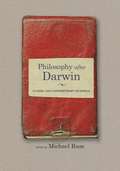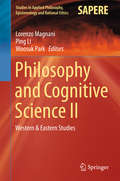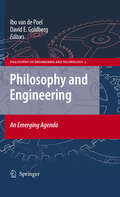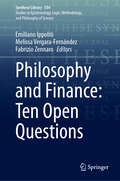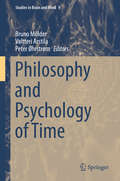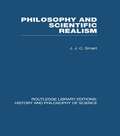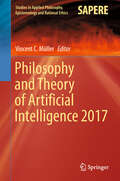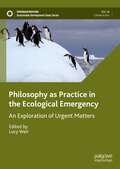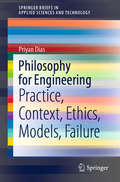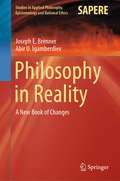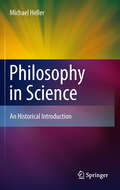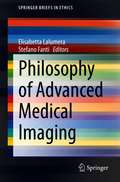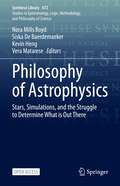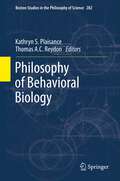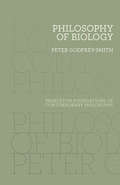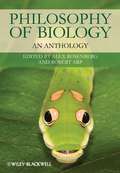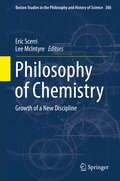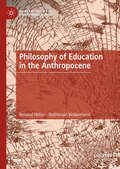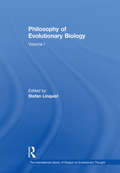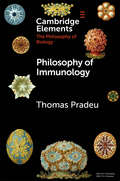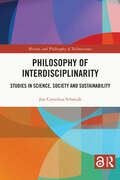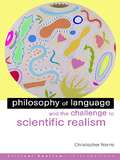- Table View
- List View
Philosophy after Darwin: Classic and Contemporary Readings
by Michael RuseWittgenstein famously remarked in 1923, "Darwin's theory has no more relevance for philosophy than any other hypothesis in natural science." Yet today we are witnessing a major revival of interest in applying evolutionary approaches to philosophical problems. Philosophy after Darwin is an anthology of essential writings covering the most influential ideas about the philosophical implications of Darwinism, from the publication of On the Origin of Species to today's cutting-edge research.Michael Ruse presents writings by leading modern thinkers and researchers--including some writings never before published--together with the most important historical documents on Darwinism and philosophy, starting with Darwin himself. Included here are Herbert Spencer, Friedrich Nietzsche, Thomas Henry Huxley, G. E. Moore, John Dewey, Konrad Lorenz, Stephen Toulmin, Karl Popper, Edward O. Wilson, Hilary Putnam, Philip Kitcher, Elliott Sober, and Peter Singer. Readers will encounter some of the staunchest critics of the evolutionary approach, such as Alvin Plantinga, as well as revealing excerpts from works like Jack London's The Call of the Wild. Ruse's comprehensive general introduction and insightful section introductions put these writings in context and explain how they relate to such fields as epistemology, philosophy of mind, philosophy of language, and ethics.An invaluable anthology and sourcebook, Philosophy after Darwin traces philosophy's complicated relationship with Darwin's dangerous idea, and shows how this relationship reflects a broad movement toward a secular, more naturalistic understanding of the human experience.
Philosophy and Cognitive Science II
by Ping Li Lorenzo Magnani Woosuk ParkThe book shows how eastern and western perspectives and conceptions can be used to addresses recent topics laying at the crossroad between philosophy and cognitive science. It reports on new points of view and conceptions discussed during the International Conference on Philosophy and Cognitive Science (PCS2013), held at the Sun Yat-sen University, in Guangzhou, China, and the 2013 Workshop on Abductive Visual Cognition, which took place at KAIST, in Deajeon, South Korea. The book emphasizes an ever-growing cultural exchange between academics and intellectuals coming from different fields. It juxtaposes research works investigating new facets on key issues between philosophy and cognitive science, such as the role of models and causal representations in science; the status of theoretical concepts and quantum principles; abductive cognition, vision, and visualization in science from an eco-cognitive perspective. Further topics are: ignorance immunization in reasoning; moral cognition, violence, and epistemology; and models and biomorphism. The book, which presents a unique and timely account of the current state-of-the art on various aspects in philosophy and cognitive science, is expected to inspire philosophers, cognitive scientists and social scientists, and to generate fruitful exchanges and collaboration among them.
Philosophy and Engineering: An Emerging Agenda
by Ibo van de Poel David E. GoldbergWhereas science, technology, and medicine have all called forth dedicated philosophical investigations, a fourth major contributor to the technoscientific world in which we all live - that is, engineering - has been accorded almost none of the philosophical attention it deserves. This volume thus offers a first characterisation of this important new field, by some of the primary philosophers and ethicists interested in engineering and leading engineers interested in philosophical reflections. The volume deals with such questions as: What is engineering? In what respect does engineering differ from science? What ethical problems does engineering raise? By what ethical principles are engineers guided? How do engineers themselves conceive of their profession? What do they see as the main philosophical challenges confronting them in the 21st century? The authors respond to these and other questions from philosophical and engineering view points and so illustrate how together they can meet the challenges and realize the opportunities present in the necessary encounters between philosophy and engineering - encounters that are ever more important in an increasingly engineered world and its problematic futures.
Philosophy and Finance: Ten Open Questions (Synthese Library #504)
by Emiliano Ippoliti Melissa Vergara-Fernández Fabrizio ZennaroThis volume presents ten thought-provoking essays exploring issues in the philosophy of finance that are crucial for the economy and society. They also show the mutual relations and benefits between finance and philosophy. These issues include the link between financial systems and climate change, the ontologies of finance that are essential for market design, the role and effect of AI in the financial systems, the nature and prospects of money and their digital version, methodological problems in the use of models and mathematics in the financial world, and critical discussions of some of the main theories on financial systems, like the efficient market hypothesis. As this volume covers a wide array of topics whilst still forming a coherent whole, it is of interest to philosophers of finance, philosophers of science, epistemologists, and philosophers of economics, as well as to scientists and practitioners interested in the debates over methodological, ontological, epistemological as well as ethical issues in finance.
Philosophy and Psychology of Time
by Bruno Mölder Valtteri Arstila Peter ØhrstrømThis book is an edited collection of papers from international experts in philosophy and psychology concerned with time. The collection aims to bridge the gap between these disciplines by focussing on five key themes and providing philosophical and psychological perspectives on each theme. The first theme is the concept of time. The discussion ranges from the folk concept of time to the notion of time in logic, philosophy and psychology. The second theme concerns the notion of present in the philosophy of mind, metaphysics, and psychology. The third theme relates to continuity and flow of time in mind. One of the key questions in this section is how the apparent temporal continuity of conscious experience relates to the possibly discrete character of underlying neural processes. The fourth theme is the timing of experiences, with a focus on the perception of simultaneity and illusions of temporal order. Such effects are treated as test cases for hypotheses about the relationship between the subjective temporal order of experience and the objective order of neural events. The fifth and the final theme of the volume is time and intersubjectivity. This section examines the role of time in interpersonal coordination and in the development of social skills. The collection will appeal to both psychologists and philosophers, but also to researchers from other disciplines who seek an accessible overview of the research on time in psychology and philosophy.
Philosophy and Scientific Realism (Routledge Library Editions: History & Philosophy of Science)
by J J SmartOriginally published in 1963. In an introductory chapter the author argues that philosophy ought to be more than the art of clarifying thought and that it should concern itself with outlining a scientifically plausible world view. Early chapters deal with phenomenalism and the reality of theoretical entities, and with the relation between the physical and biological sciences. Free will, issues of time and space and man’s place in nature are covered in later chapters.
Philosophy and Theory of Artificial Intelligence 2017 (Studies in Applied Philosophy, Epistemology and Rational Ethics #44)
by Vincent C. MüllerThis book reports on the results of the third edition of the premier conference in the field of philosophy of artificial intelligence, PT-AI 2017, held on November 4 - 5, 2017 at the University of Leeds, UK. It covers: advanced knowledge on key AI concepts, including complexity, computation, creativity, embodiment, representation and superintelligence; cutting-edge ethical issues, such as the AI impact on human dignity and society, responsibilities and rights of machines, as well as AI threats to humanity and AI safety; and cutting-edge developments in techniques to achieve AI, including machine learning, neural networks, dynamical systems. The book also discusses important applications of AI, including big data analytics, expert systems, cognitive architectures, and robotics. It offers a timely, yet very comprehensive snapshot of what is going on in the field of AI, especially at the interfaces between philosophy, cognitive science, ethics and computing.
Philosophy and the Foundations of Dynamics
by Lawrence SklarAlthough now replaced by more modern theories, classical mechanics remains a core foundational element of physical theory. From its inception, the theory of dynamics has been riddled with conceptual issues and differing philosophical interpretations and throughout its long historical development, it has shown subtle conceptual refinement. The interpretive program for the theory has also shown deep evolutionary change over time. Lawrence Sklar discusses crucial issues in the central theory from which contemporary foundational theories are derived and shows how some core issues (the nature of force, the place of absolute reference frames) have nevertheless remained deep puzzles despite the increasingly sophisticated understanding of the theory which has been acquired over time. His book will be of great interest to philosophers of science, philosophers in general and physicists concerned with foundational interpretive issues in their field.
Philosophy and the Precautionary Principle
by Daniel SteelScholars in philosophy, law, economics and other fields have widely debated how science, environmental precaution, and economic interests should be balanced in urgent contemporary problems, such as climate change. One controversial focus of these discussions is the precautionary principle, according to which scientific uncertainty should not be a reason for delay in the face of serious threats to the environment or health. While the precautionary principle has been very influential, no generally accepted definition of it exists and critics charge that it is incoherent or hopelessly vague. This book presents and defends an interpretation of the precautionary principle from the perspective of philosophy of science, looking particularly at how it connects to decisions, scientific procedures, and evidence. Through careful analysis of numerous case studies, it shows how this interpretation leads to important insights on scientific uncertainty, intergenerational justice, and the relationship between values and policy-relevant science.
Philosophy as Practice in the Ecological Emergency: An Exploration of Urgent Matters (Sustainable Development Goals Series)
by Lucy WeirThis book argues that philosophy is as practical as plumbing and what we need right now is what philosophers can offer as philosophers to help us all, our species, and beyond, through this ecological emergency, this climate change, this anthropocene. This book is about the meaning and purpose of philosophy as a way of, a practice of, responding to the ecological emergency, which includes climate change, biodiversity loss, pollution, habitat destruction, and all the associated impacts that fragment, and threaten to create collapse, among the systems that created and sustain us. There are the related economic and social impacts, the fragmentation of communities and political ideologies through attitude polarisation, and the increasing threats to systems by those who seek to promote further exploitation at the expense of attempts to regain some system of cooperation and an attitude of compassion which is at the heart of our survival strategies as a species. Philosophy has always sought to address questions related both to our place in the universe, and to how to live, given our understanding of our place. Those of us committed to a philosophical life have used a range of metaphors and narratives to enlighten, and to exhort to action, those who would seek to understand what to do, how, and why. Philosophy has played a key role in helping us as a species to respond to the ecological emergency. What, then, is the practice of philosophy, given that we’re in an ecological emergency?This question is the thread, and it forms the framework for the dialogue that runs through the book.
Philosophy for Engineering: Practice, Context, Ethics, Models, Failure (SpringerBriefs in Applied Sciences and Technology)
by Priyan DiasThis book highlights the unique need for philosophy among engineers, which stems from issues regarding their knowledge (epistemology), role or being (ontology) and influence (ethics). It discusses practice, context, ethics, models and failure as key aspects of engineering, and provides an easy but essential introduction to philosophy for engineers by presenting four key philosophers and linking them to these aspects: Karl Popper (failure), Thomas Kuhn (models), Michael Polanyi (practice & ethics) and Martin Heidegger (context & ethics). Popper, Kuhn and Polanyi are philosophers of science (epistemologists) who have challenged the view that science is a ‘cool, detached’ discipline, since it also depends on human imagination (Popper), consensus (Kuhn) and judgment plus artistry (Polanyi); factors that are central to engineering. Heidegger (an ontologist) critiqued technology on the one hand (ethics), but also stressed the importance of ‘doing’ over ‘knowing,’ thus ‘authenticating’ the highly pragmatic engineering profession. Science is the ‘core’ component of engineering, which is overlaid by a variety of heuristics . Practice-based knowledge can be formalized, with artificial intelligence (AI) offering a valuable tool for engineering, just as mathematics has done for science. The book also examines systems thinking in engineering. Featuring numerous diagrams, tables and examples throughout, the book is easily accessible to engineers.
Philosophy in Reality: A New Book of Changes (Studies in Applied Philosophy, Epistemology and Rational Ethics #60)
by Abir U. Igamberdiev Joseph E. BrennerPhilosophy in Reality offers a new vision of the relation between science and philosophy in the framework of a non-propositional logic of real processes, grounded in the physics of the real world. This logical system is based on the work of the Franco-Romanian thinker Stéphane Lupasco (1900-1988), previously presented by Joseph Brenner in the book Logic in Reality (Springer, 2008). The present book was inspired in part by the ancient Chinese Book of Changes (I Ching) and its scientific-philosophical discussion of change. The emphasis in Philosophy in Reality is on the recovery of dialectics and semantics from reductionist applications and their incorporation into a new synthetic paradigm for knowledge. Through an original re-interpretation of both classical and modern Western thought, this book addresses philosophical issues in scientific fields as well as long-standing conceptual problems such as the origin, nature and role of meaning, the unity of knowledge and the origin of morality. In a rigorous transdisciplinary manner, it discusses foundational and current issues in the physical sciences - mathematics, information, communication and systems theory and their implications for philosophy. The same framework is applied to problems of the origins of society, the transformation of reality by human subjects, and the emergence of a global, sustainable information society. In summary, Philosophy in Reality provides a wealth of new perspectives and references, supporting research by both philosophers and physical and social scientists concerned with the many facets of reality.
Philosophy in Science
by Michael HellerThe traditional topics of the "philosophy of nature" -- space, time, causality, the structure of the universe -- are overwhelmingly present in our modern scientific theories. This book traces the complex paths that discussion of these topics has followed, from Plato and Aristotle, through Descartes, Leibniz, Kant and other great thinkers, right up to the relativistic cosmologies and the grand unified theories of contemporary science. In the light of this historical development, it becomes clear that modern science gives us not only a technological power over the world, but also a deeper understanding of physical reality. In this sense, science could be regarded as an heir to the traditional "philosophy of nature". Moreover, the reader will learn why science itself deserves to be the subject of philosophical reflection.
Philosophy of Advanced Medical Imaging (SpringerBriefs in Ethics)
by Stefano Fanti Elisabetta LalumeraThis is the first book to explore the epistemology and ethics of advanced imaging tests, in order to improve the critical understanding of the nature of knowledge they provide and the practical consequences of their utilization in healthcare. Advanced medical imaging tests, such as PET and MRI, have gained center stage in medical research and in patients’ care. They also increasingly raise questions that pertain to philosophy: What is required to be an expert in reading images? How are standards for interpretation to be fixed? Is there a problem of overutilization of such tests? How should uncertainty be communicated to patients? How to cope with incidental findings? This book is of interest and importance to scholars of philosophy of medicine at all levels, from undergraduates to researchers, to medical researchers and practitioners (radiologists and nuclear physicians) interested in a critical appraisal of the methodology of their discipline and in the ethical principles and consequences of their work.
Philosophy of Astrophysics: Stars, Simulations, and the Struggle to Determine What is Out There (Synthese Library #472)
by Kevin Heng Nora Mills Boyd Siska De Baerdemaeker Vera MatareseThis is an open access book. This book, the first edited collection of its kind, explores the recent emergence of philosophical research in astrophysics. It assembles a variety of original essays from scholars who are currently shaping this field, and it combines insightful overviews of the current state of play with novel, significant contributions. It therefore provides an ideal source for understanding the current debates in philosophy of astrophysics, and it offers new ideas for future cutting-edge research. The selection of essays offered in this book addresses methodological and metaphysical questions that target a wide range of topics, including dark matter, black holes, astrophysical observations and modelling.The book serves as the first standard resource in philosophy of astrophysics for all scholars who work in the field and want to expand or deepen their knowledge, but it also provides an accessible guide for all those philosophers and scientists who are interested in getting a first, basic understanding of the main issues in philosophy of astrophysics.
Philosophy of Behavioral Biology
by Thomas A.C. Reydon Kathryn S. PlaisanceThis volume provides a broad overview of issues in the philosophy of behavioral biology, covering four main themes: genetic, developmental, evolutionary, and neurobiological explanations of behavior. It is both interdisciplinary and empirically informed in its approach, addressing philosophical issues that arise from recent scientific findings in biological research on human and non-human animal behavior. Accordingly, it includes papers by professional philosophers and philosophers of science, as well as practicing scientists. Much of the work in this volume builds on presentations given at the international conference, "Biological Explanations of Behavior: Philosophical Perspectives", held in 2008 at the Leibniz Universität Hannover in Germany. The volume is intended to be of interest to a broad range of audiences, which includes philosophers (e.g., philosophers of mind, philosophers of biology, and metaethicists), as well as practicing scientists, such as biologists or psychologists whose interests relate to biological explanations of behavior.
Philosophy of Biology (Princeton Foundations of Contemporary Philosophy #8)
by Peter Godfrey-SmithAn essential introduction to the philosophy of biologyThis is a concise, comprehensive, and accessible introduction to the philosophy of biology written by a leading authority on the subject. Geared to philosophers, biologists, and students of both, the book provides sophisticated and innovative coverage of the central topics and many of the latest developments in the field. Emphasizing connections between biological theories and other areas of philosophy, and carefully explaining both philosophical and biological terms, Peter Godfrey-Smith discusses the relation between philosophy and science; examines the role of laws, mechanistic explanation, and idealized models in biological theories; describes evolution by natural selection; and assesses attempts to extend Darwin's mechanism to explain changes in ideas, culture, and other phenomena. Further topics include functions and teleology, individuality and organisms, species, the tree of life, and human nature. The book closes with detailed, cutting-edge treatments of the evolution of cooperation, of information in biology, and of the role of communication in living systems at all scales.Authoritative and up-to-date, this is an essential guide for anyone interested in the important philosophical issues raised by the biological sciences.
Philosophy of Biology: An Anthology
by Robert Arp Alex RosenbergBy combining excerpts from key historical writings with editors' introductions and further reading material, Philosophy of Biology: An Anthology offers a comprehensive, accessible, and up-to-date collection of the field's most significant works. Addresses central questions such as 'What is life?' and 'How did it begin?', and the most current research and arguments on evolution and developmental biology Editorial notes throughout the text define, clarify, and qualify ideas, concepts and arguments Includes material on evolutionary psychology and evolutionary developmental biology not found in other standard philosophy of biology anthologies Further reading material assists novices in delving deeper into research in philosophy of biology
Philosophy of Chemistry
by Lee Mcintyre Eric ScerriThis volume follows the successful book, which has helped to introduce and spread the Philosophy of Chemistry to a wider audience of philosophers, historians, science educators as well as chemists, physicists and biologists. The introduction summarizes the way in which the field has developed in the ten years since the previous volume was conceived and introduces several new authors who did not contribute to the first edition. The editors are well placed to assemble this book, as they are the editor in chief and deputy editors of the leading academic journal in the field, Foundations of Chemistry. The philosophy of chemistry remains a somewhat neglected field, unlike the philosophy of physics and the philosophy of biology. Why there has been little philosophical attention to the central discipline of chemistry among the three natural sciences is a theme that is explored by several of the contributors. This volume will do a great deal to redress this imbalance. Among the themes covered is the question of reduction of chemistry to physics, the reduction of biology to chemistry, whether true chemical laws exist and causality in chemistry. In addition more general questions of the nature of organic chemistry, biochemistry and chemical synthesis are examined by specialist in these areas.
Philosophy of Chemistry (Integrated Science #2)
by Hrvoj VančikThis book, Philosophy of Chemistry, is dedicated to some of the general principles of philosophy of chemistry, the special branch of philosophy of science. Since the work is a collection of lectures that the Author gave at the University of Zagreb (Croatia) during the period of twenty years, the book could serve also as a university textbook in philosophy of chemistry. Philosophy of chemistry is represented through the discussion about some of the general philosophical problems such as, theory of complexity, autonomy of sciences, epistemology, falsificationism, emergence and unity of science, holism and reductionism, the problem of identity, and hierarchical structures, as well as the teleological aspects of science. The work consists from thirteen chapters where the main science-philosophical problems are represented and discussed within the historical context of the development of chemistry as a science. The book is aimed at wider academic audience interesting in the philosophy of science, and especially at university students of life sciences.
Philosophy of Education in the Anthropocene (Palgrave Studies in Educational Futures)
by Renaud Hétier Nathanaël WallenhorstThis book develops a philosophy of education for the Anthropocene, proposing that we think about education in the light of contemporary bioclimatic challenges. Education is seen as the political means of choice for containing the runaway Earth system change and ensuring the sustainability of human life in society. In this book, Hétier and Wallenhorst continue their work on the biogeophysical and socio-political analysis of the Anthropocene here, tracing the path toward the re-founding of a political education to prepare students to address the greatest challenge of our time: the gradual disappearance of the bioclimatic conditions necessary for our very existence.
Philosophy of Evolutionary Biology: Volume I (The International Library of Essays on Evolutionary Thought)
by Stefan LinquistThe impact of evolutionary theory on the philosophy of science has been no less profound than its impact on the science of biology itself. Advances in this theory provide a rich set of examples for thinking about the nature of scientific explanation and the structure of science. Many of the developments in our understanding of evolution resulted from contributions by both philosophers and biologists engaging over theoretical questions of mutual interest. This volume traces some of the most influential exchanges in this field over the last few decades. Focal topics include the nature of biological functions, adaptationism as an explanatory and methodological doctrine, the levels of selection debate, the concepts of fitness and drift, and the relationship of evolutionary to developmental biology.
Philosophy of Immunology (Elements in the Philosophy of Biology)
by Thomas PradeuImmunology is central to contemporary biology and medicine, but it also provides novel philosophical insights. Its most significant contribution to philosophy concerns the understanding of biological individuality: what a biological individual is, what makes it unique, how its boundaries are established and what ensures its identity through time. Immunology also offers answers to some of the most interesting philosophical questions. What is the definition of life? How are bodily systems delineated? How do the mind and the body interact? In this Element, Thomas Pradeu considers the ways in which immunology can shed light on these and other important philosophical issues. This title is also available as Open Access on Cambridge Core.
Philosophy of Interdisciplinarity: Studies in Science, Society and Sustainability (History and Philosophy of Technoscience)
by Jan Cornelius SchmidtInterdisciplinarity is a hallmark of contemporary knowledge production. This book introduces a Philosophy of Interdisciplinarity at the intersection of science, society and sustainability. In light of the ambivalence of the technosciences and the challenge of sustainable development in the Anthropocene, this engaged philosophy provides a novel critical perspective on interdisciplinarity in science policy and research practice. It draws upon the original spirit of interdisciplinarity as an environmentalist concept and advocates an essential change in human-nature relations. The author utilizes the rich tradition of philosophy for case study analysis and develops a framework to disentangle the various forms of inter- and transdisciplinarity. Philosophy of Interdisciplinarity offers a foundation for a critical-reflexive program of interdisciplinarity conducive to a sustainable future for our knowledge society and contributes to fields such as sustainability sciences, social ecology, environmental ethics, technology assessment, complex systems, philosophy of nature, and philosophy of science. It injects a fresh way of thinking on interdisciplinarity – and supports researchers as well as science policy makers, university managers, and academic administrators in critical-reflexive knowledge production for sustainable development.
Philosophy of Language and the Challenge to Scientific Realism (Routledge Studies in Critical Realism)
by Christopher NorrisIn this book Christopher Norris develops the case for scientific realism by tackling various adversary arguments from a range of anti-realist positions. Through a close critical reading he shows how they fail to make adequate sense on any rational, consistent, and scientifically-informed survey of the evidence. Along the way he incorporates a number of detailed case-studies from the history and philosophy of science. Norris devotes much of his discussion to some of the most prominent and widely influential source-texts of anti-realism. Also included are the sophisticated versions of verificationism developed - albeit in very different ways - by thinkers such as Michael Dummett and Bas van Fraassen. Central to Norris's argument is a prolonged engagement with the once highly influential but nowadays neglected work of Norwood Russell Hanson. This book will be welcomed especially by readers who possess some knowledge of the background debate and who wish to deepen and extend their understanding of these issues beyond an introductory level.
